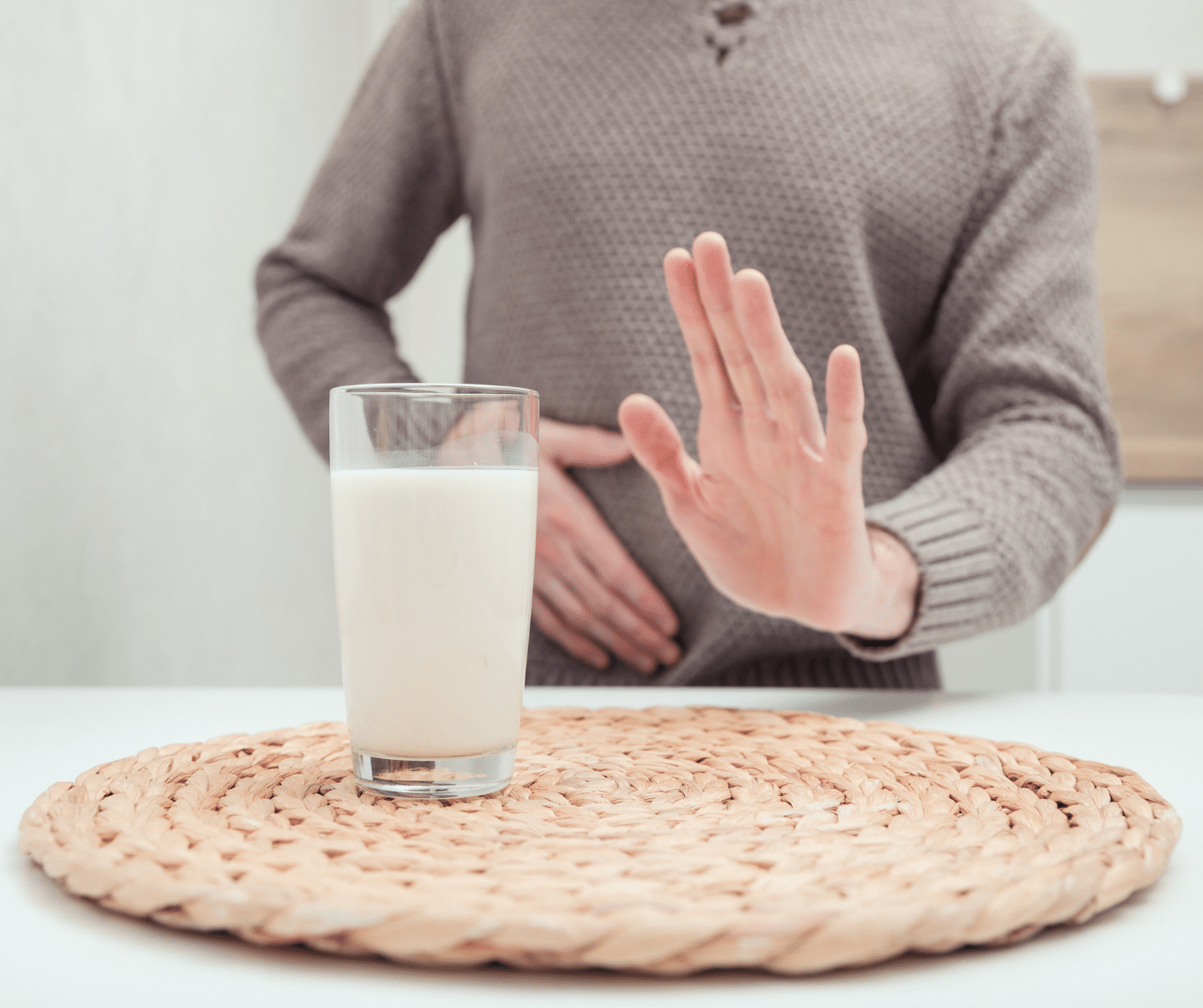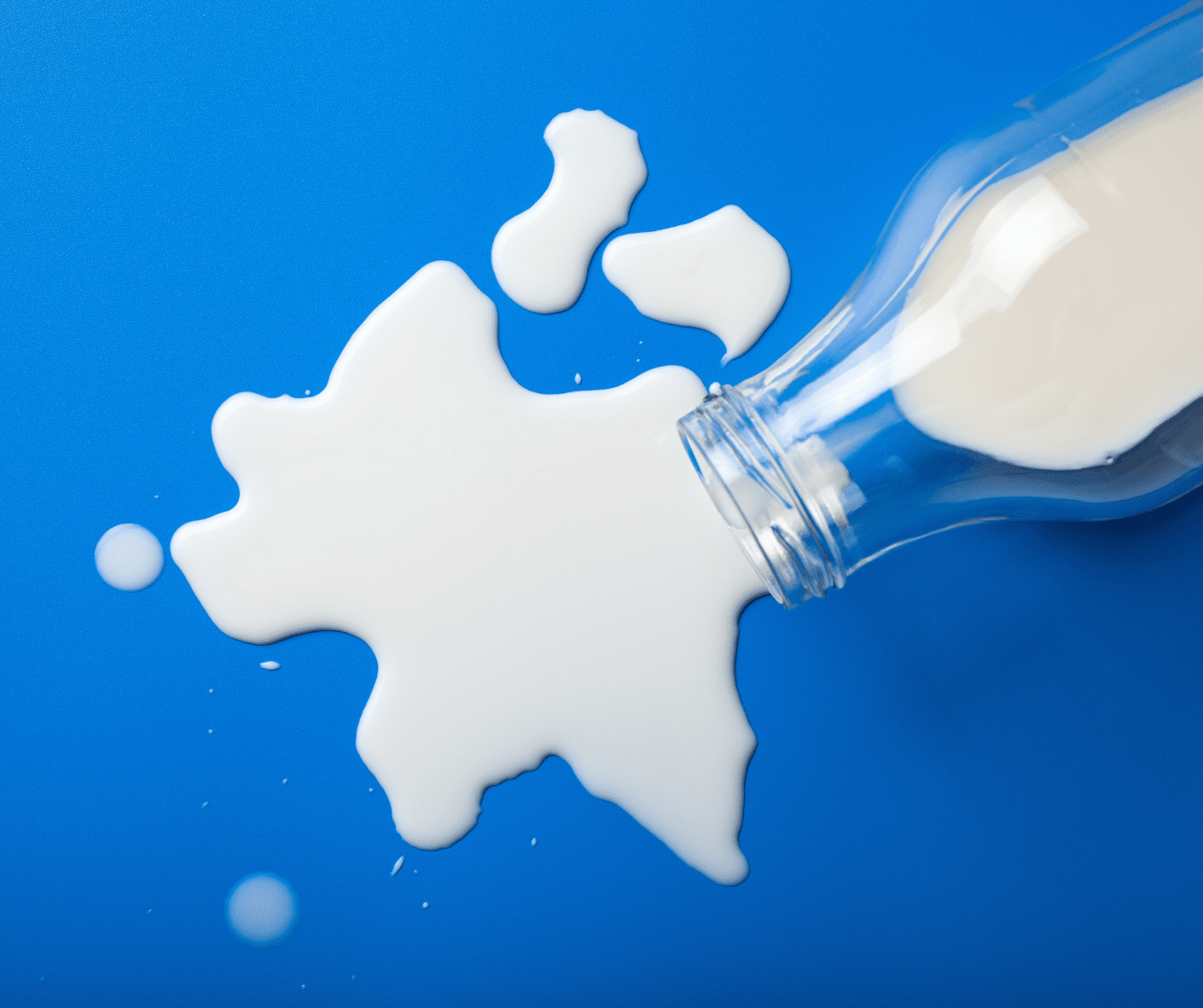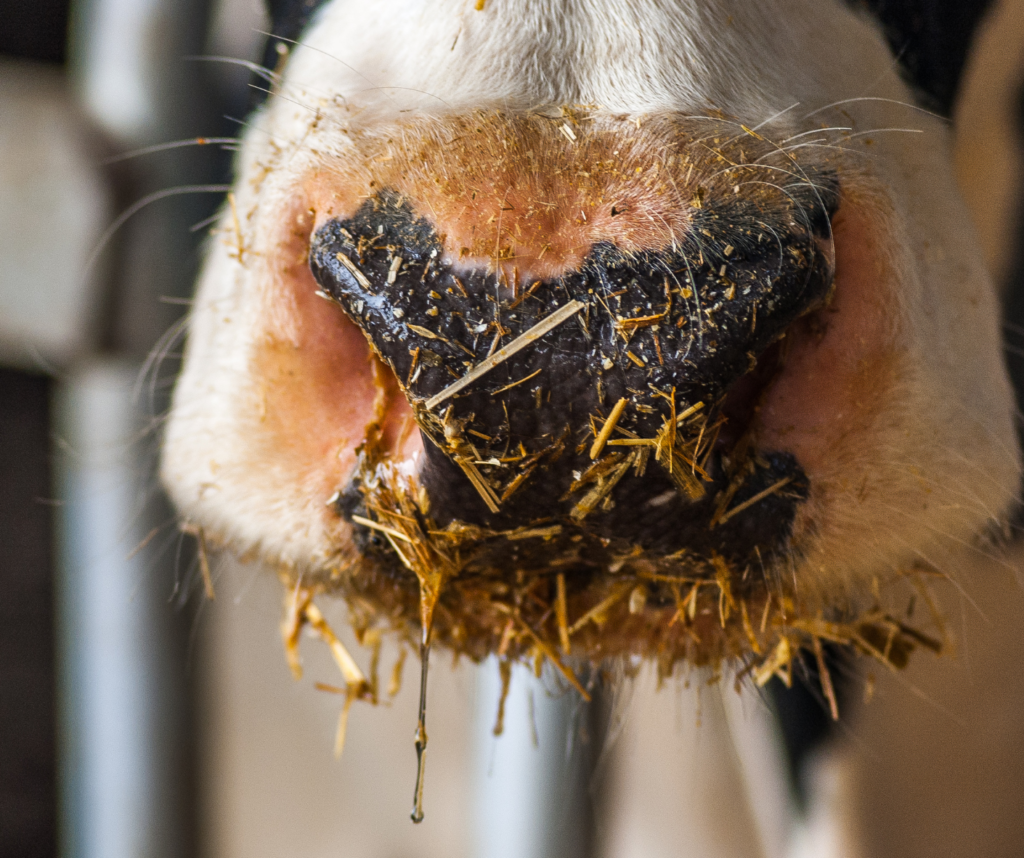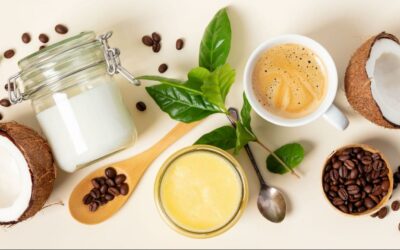Is Cow’s Milk Really Good for You?
With so much conflicting information all around us about dairy milk, knowing the answer to that can be tough. From commercials to noise on the internet, everyone seems to have a different opinion.

65% of the population is lactose intolerant.
So, is animal-based dairy milk healthy for humans to consume? The short answer: No. In this article we will dig into many of the different ways that animal-based milk is not good for our health, bodies, or overall wellness in order to break down the long-standing myth that breast milk from other animals is a necessary and vital part of the human diet.
1) Lactose Intolerance Is Common and Harmful
Let’s start with lactose intolerance. Lactose intolerance is a digestion issue in which a person lacks the enzyme lactase. Without it, the body cannot break down lactose, which is the sugar component found in breastmilk. Since lactase’s only function is the digestion of lactose in milk (including human breast milk), the activity of the enzyme decreases precipitously after age five because the body is designed to wean off its mother’s milk and sustain itself on food. This is the truth about dairy that not many people know.
65% of the population is lactose intolerant, making it the norm. Lactose intolerance causes symptoms such as bloating, gas, diarrea, cramping, stomach pain, constipation, and more. These side effects of milk range in severity and often make it hard for people to get through their day comfortably. This is just one of the reasons why milk is bad for you.
2) Cow’s Milk #1 Cause of Fatal Anaphylaxis in Children
A 20-year study done in the UK uncovered that although the fatality rate has decreased for food-induced anaphylaxis, hospital admissions have increased threefold from 1998 to 2018.

In school-aged children, dairy is now the most common single cause of fatal anaphylaxis.
The study goes on to highlight that in school-aged children, dairy is now the most common single cause of fatal anaphylaxis. Thanks to this study we know that cow’s milk is now the strongest driver of fatal food anaphylaxis in children in the UK, and this pattern has also been noted in North America and Israel.
3) Dairy Linked to Acne and Eczema
A 2018 review of scientific research covering 78,529 children, adolescents, and young adults found that the consumption of any animal-based dairy (including animal-based milk, cheese and yogurts) was associated with a greater risk of acne.
While there is still some debate as to the direct correlation between dairy foods and these skin conditions, some experts believe that the hormones and IGF-1 found in dairy contribute to acne issues, and eczema could be the result of a dairy allergy reaction. No matter the link, we’ve experienced firsthand the benefits a dairy-free lifestyle can have on complexion. Several of our coalition members have cured themselves by ditching dairy. Dr. Angie Sadeghi no longer suffers from chronic eczema, and bodybuilder Brian Turner reversed his teenage acne by giving up dairy at 15 years old.
4) Dairy Exacerbates Asthma Symptoms
Struggling with asthma? It may be time to kick dairy to the curb. Studies have shown that asthma sufferers can significantly reduce or eliminate their symptoms by giving up dairy and other animal foods. In one study, 92% of participants saw drastic improvements after giving up dairy for a year.
5) It’s True, Milk is Linked to Cancer
Yep, sad but true. Milk from other animals is linked to cancer in human bodies. Dairy can stimulate unregulated cell growth and increase one’s risk for hormone-dependent cancers. On top of that, a 2015 meta-analysis in the American Journal of Clinical Nutrition found that high intakes of animal-based dairy products increase the risk for prostate cancer, while other research found that people who drank more than one glass of whole animal-based milk per day had twice the risk of fatal prostate cancer.

Research shows that whole animal-based milk may increase the risk of ovarian cancer.
To make things even worse, research shows that whole animal-based milk may increase the risk of ovarian cancer. One study found that those with the highest intake of whole milk and lactose increased their risk for ovarian cancer, compared with those who consumed the least.
Another study found that women who reported just eight ounces of cow’s milk a day increased their risk of breast cancer by 50%. Those who consumed two to three glasses escalated their risk up to 80% (in comparison to the women who did not drink any cow’s milk). To clarify, drinking one cup of cow’s milk per day does not guarantee a woman is 50 percent more likely to get breast cancer. It does, however, suggest that her individual risk increases by 50 percent. So, if a person has an inherent 12 percent risk (the average), she can increase that risk by half simply by sipping one cow’s milk latte or dairy-based smoothie a day.
6) Cow’s Milk Gives You Brittle Bones
Yes, it’s true: cow’s milk contains calcium. But what you probably didn’t know is that only about 30% of it can be absorbed by the body. In fact, a 12-year prospective study found that regular daily consumption of dairy products actually increased one’s risk of hip fracture. Want strong bones? Try tahini, bok choy, broccoli, and these foods instead.
7) Cow’s Milk Contains Toxic Substances for Your Body
Cow’s milk can contain veterinary drugs, pesticide residues, pathogens, and heavy metals. In addition, due to mastitis (udder infection endemic in cows used by the dairy industry), white blood cells from the cows’ immune systems end up in their breast milk that humans consume.

Cow’s milk can contain veterinary drugs, pesticide residues, pathogens, and heavy metals.
These are called “neutrophils” and they are the primary component of pus. In the US the FDA allows 750 million pus cells in every liter of milk. So it’s likely you’ve ingested some. In Europe, regulators allow 400 million pus cells per liter. In Australia there is no limit on how much pus is allowable.
8) Dairy Products Are High in Cholesterol and Saturated Fat
Animal-based dairy products are high in saturated fat which means the cholesterol levels in our bodies rise with the consumption of milk. In fact cholesterol is only found in animal-based foods. Cholesterol is a waxy, fat-like substance that can build up in your arteries and contributes to heart disease and other health issues.
9) Dairy Leads to Other Chronic Conditions
Cow’s milk contains trans and saturated fats, both of which are linked to heart disease and obesity. It also triggers our bodies to produce excess amounts of insulin, which leads to a greater risk of developing type 2 diabetes.
Drinking breast milk from other species (especially cows) is putting human health and wellness on the line. With so many plant-based milks, cheeses, and other plant-based dairy products out there, the options today are endless. You can still get your milk, cheese, or yogurt fix without putting your body at risk. It may sound like a big change, but Switch4Good is here to help. Check out how to ditch dairy now on our website and listen to the Switch4Good podcast where we have compelling conversations with health experts to bring you facts, inspiration and motivation.
Learn More About Dairy Through Health Studies
In conclusion, cow’s milk is bad for you in so many ways. But don’t just take our word for it; there are so many studies out there to back up what we’re saying. If you’re interested in why milk is bad for you when it comes to fatal anaphylaxis, check out this study called ‘Cow’s Milk Ranks as the Number One Cause of Fatal Anaphylaxis’.

Cow’s milk is bad for you in so many ways. But don’t just take our word for it; there are so many studies out there to back up what we’re saying.
If you’re wondering why milk is bad for you when it comes to breast cancer risks, read this review of a study that shows how dairy (not soy) skyrockets breast cancer risks. Don’t stop your research there – learn why milk is bad for you when it comes to acne, diabetes, and cancer. Be sure to learn about the largest comprehensive study of dairy and disease, and read about dairy and its link to diabetes.
So, Do We Really Need Dairy Milk?
Now that you know that dairy is bad for you – and it is backed up by science – the choice is yours. If you decide to embark on your dairy-free journey, we’re here to help you at every step. Let our athletes, scientists, and plant-based experts at Switch4Good be your support system and help you make the switch.
Ready to Cut Out Cow’s Milk? Here’s What You Can Try
In a world where we now have oat, soy, rice, pea, hemp, cashew, almond, and coconut milks available, making the best choice for yourself can be overwhelming. The options for non dairy milks are endless. Take your health into your own hands with our Milk Comparison Calculator and find out which milk is best for you, and then confidently hit the grocery store with our Ultimate Guide to Dairy-Free Alternatives in your back pocket. Your body, the animals, and the planet will thank you for making the switch.








